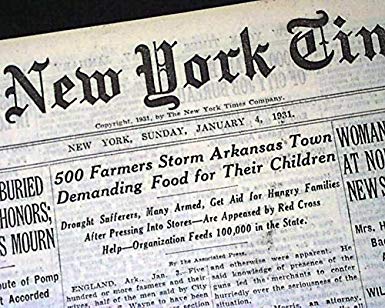This Day in Labor History: January 3, 1931

On January 3, 1931, farmers converged on England, Arkansas to demand poverty relief. This led to Will Rogers’ poverty tour and a greater national conversation about conditions in rural America in the early years of the Great Depression.
In 1930, Arkansas suffered a severe drought, the worst in the state’s history to that time. The state was devastated. People didn’t grow enough food there anyway, being part of the cotton culture that dominated the region and it was clear by the end of the year that it would not be able to feed itself. Arkansas’ senators went to Herbert Hoover and asked for drought relief. Naturally enough, he refused, as for him, state-run relief just created welfare dependency. And as Hoover, who certainly knew famine from his food relief days in Europe, noted, the people of Arkansas weren’t actually suffering too much yet. So much for preventive action. The state government wasn’t much more helpful, in part because the landowners on the Mississippi Delta didn’t want their tenants getting relief that might convince them not to work. The Red Cross got involved to some extent, but things were pretty bad as 1930 turned into 1931. By November, both pellagra and typhoid were on the rise.
On January 3, 1931, a tenant farmer named H.C. Lokey was paid a visit by a neighbor, who told him flat out that she could not feed her children. With the Red Cross just starting to show an interest, Lokey loaded up his truck with some neighbors and went to the nearby town of England, southeast of Little Rock, to demand relief. Their number quickly to about 50 farmers and some reports said 300-500 people in total, many from the town. They walked up to the Red Cross office and demanded promised food relief. The Red Cross was not ready for this yet and did not have the needed paperwork. Something like paperwork did not matter to starving tenant farmers. The town’s merchants, threatened with a food riot, just gave away all they had to forestall violence.
This small story got picked up by newspapers. It was called a “riot,” which is massively overblown language for what happened there. What it did do is force Arkansas politicians to do something about it. The governor, Henry Parnell, had been indifferent to the needs of the farmers before this, now he had to retract his statements that there was no crisis. Senator Joe T. Robinson pushed harder for a federal hunger relief bill.
On January 23, Will Rogers came to town. The legendary humorist and writer from Oklahoma knew this area. He wanted to help. He had personally appealed to Hoover for food relief, but the president was as indifferent to the suffering as before. So that went nowhere. Rogers decided then to raise money on his own and he stopped in England to kick off this effort. While there, he met with the farmers involved, with the merchants, and with the mayor, who was sympathetic to the nearby starving farmers throughout this whole process. In 18 days, Rogers traveled through Arkansas, Oklahoma, and Texas to raise money for drought relief. All the money raised was to go to the Red Cross. He raised $3 million in that effort. This was also the last time that Rogers did a major tour of his home state before his 1935 death in a plane crash and this tour is fondly remembered by the people of Oklahoma as well. Rogers was long concerned about economic questions and poverty and this 1931 speech that C-Span has archived is pretty interesting. He works a lot of outrage through his aw-shucks persona and you can watch him slowly get to the point that there is no reason anyone should be going hungry in this nation.
While the drought in Arkansas abated in 1931, the problems of rural workers really did not. The Dust Bowl is the most famous problem these people faced in the Great Depression, but it was really the New Deal agricultural centralization practices that began with the Agricultural Adjustment Act that really threw people like the fictional Joads off their land. Between the growth of agribusiness and mechanization, there just wasn’t much ability for people to stay on the farms anymore. This would start a widespread migration of both white and black (who were already escaping Jim Crow) out of the South and into the cities of the North and West in the late 1930s and on through and after World War II.
I borrowed some from the excellent Encyclopedia of Arkansas for this post. Incidentally, I was asked to contribute an entry to this great resource based on a grave post I wrote about Claude Lightfoot, a black communist from Arkansas, though he had grown up and lived in Chicago. So who knew that the grave series would get me an actual publication!
This is the 341th post in this series. Previous posts are archived here.


